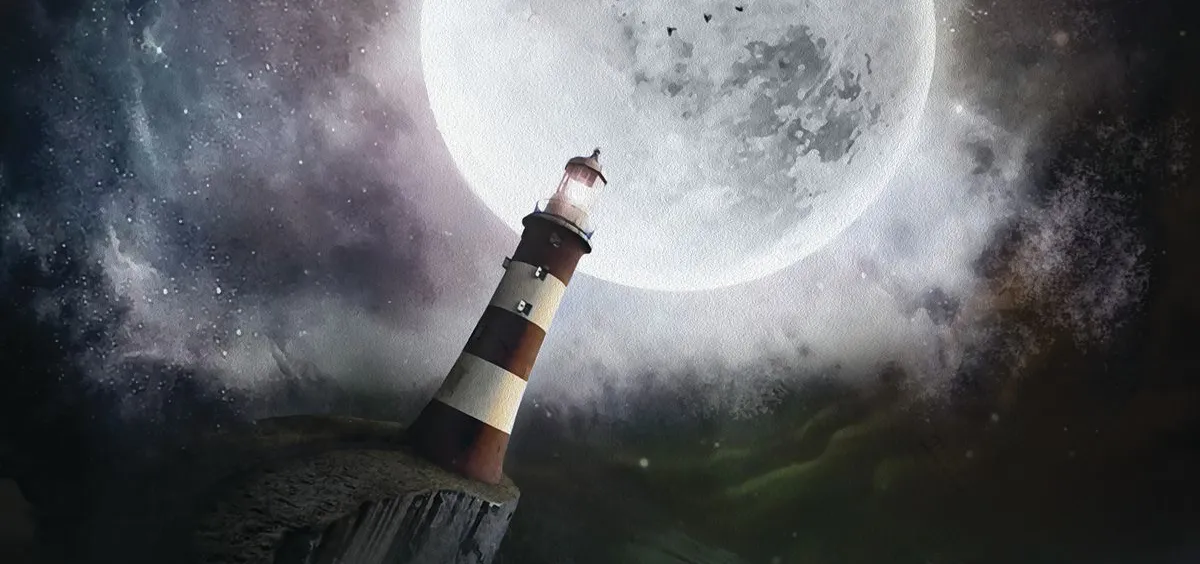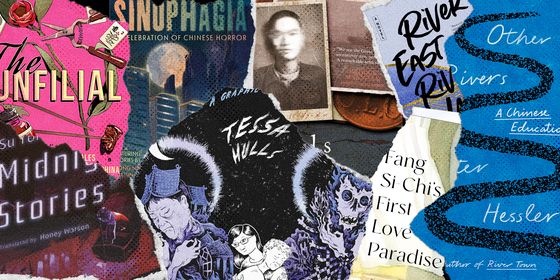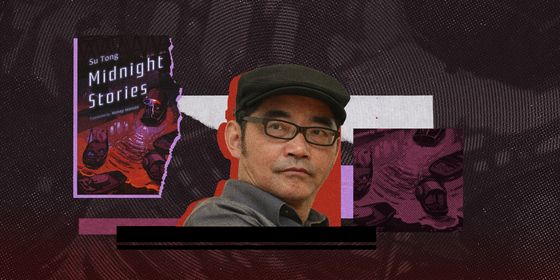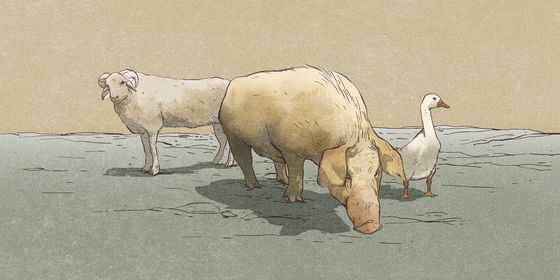Author An Wei explores the nature of reality and the self, and whether one has a choice to accept either
I sat up in the canoe and saw the moon hanging large in the sky; the light seemed to drip down like drops of water. The sea breeze rushed past and my cold body couldn’t help but shiver. I slowly exhaled a heavy breath and rubbed my eyes with the backs of my hands, maybe too hard; tears almost came out. I looked up at the moon, so round in the sky. Beneath it, there was a thin silhouette in the light. That was my destination.
The canoe rested against a simple pier at the lighthouse. I climbed up, and tied the canoe to the post. I stood at the door of the lighthouse and twisted the handle, but it didn’t turn, so I pushed gently and it opened. There was a stairway in front.
“Is anybody there?” I called out.
After a while, a faint voice filtered down to my ears.
“Wait a moment, I’m coming.”
I stood there for a while at the base of the stairs, but didn’t see anyone. I then sat on the steps, facing the open door and looking out at the pitch-dark sea. Because the moon was behind me, I could see all the stars in the sky and the horizon where ocean and sky met.
“I’m sorry for making you wait,” the woman’s voice said again, but much louder.
I turned around and saw her standing behind me. She was as beautiful as her voice.
“Don’t worry,” I stood up. “Time is something I have.”
“So you’re…the new lighthouse keeper?”
I nodded, “Maybe, at least that’s as much as I know.”
“Well, then that’s all right.” She laughed, “Every keeper is like this.”
“And you? You’re the former keeper?”
“No,” she said. “I’m the keeper’s assistant.”
“And what about the last keeper?”
“Well, he’s gone, and now you’re here.
“Well, yeah, that makes sense.”
I followed her on the spiral staircase, endlessly up, round and round. There were no lights or windows, but it wasn’t dark. I felt that the light flowed down from above. Not long after, her voice became distant again, like it sounded when she first answered. It was a strange feeling, like the stairs were winding a straight plane round and round the tower. I looked up and found my view unobstructed; I could see the wavering light emanating from the top floor of the lighthouse, just as if I were outside the tower. I couldn’t make up my mind whether I was spiralling up or if the staircase was straight. For the first time, I discovered it was easier to lose oneself on a straight road than on a curved one.
I didn’t feel lost, though. What kept me alert was the scent of her body. It wasn’t just fragrant; it also had a calming gentleness. Smelling her scent, being around her, everything else became unimportant, even natural.
Stepping through time, fragrance, light, and stairs, we came closer to that entrance. When we were almost covered by the light, she opened a door to the right, and we walked in. After we closed the window, the light was outside. Even though the room didn’t have a light of its own, it had a large window. Light from the huge moon spilled in from outside, but it was no longer grandiose, just gentle and calm.
The light in the center of the room illuminated a small wooden table with a wooden chair next to it. In the darkness on the side of the room, there was a single bed and a bookshelf. There were no other furnishings.
“This is your room. If you need anything, you can go to the room upstairs to get me.” She pointed to the door behind her.
“So what’s my job?”
“To guard this tower.” She laughed, “Guard the light; don’t let it go out.”
I nodded—that’s right, that was the keeper’s basic job.
I walked over to the bookshelf. There was the keeper’s diary and some CDs.
“So many CDs, but no CD player,” I said.
“You don’t need a CD player.”
“I can listen to the CDs without one?”
“I don’t know. But the previous keeper never needed a CD player.”
“All right, thanks.”
“You’ve had a long journey; you should rest. I’ll leave you alone.” As the woman finished speaking, she pulled the door open and walked out. The light outside faded.
I toppled onto the bed and flexed a bit. I fell asleep quickly.
Naturally, I had no dreams.
I woke up and had a sudden desire to take one of the CDs and put it on the desk with the reflective side up. When the moonlight hit the CD, a sparkling light was reflected, and a solid image appeared in the room. There was a majestic mountain, covered in ancient trees. A waterfall flowed down the mountain’s face, and small streams joined in and split up again, giving the mountain spirit and life.
In the midst of this vivid imagery, my senses of hearing, smell, and touch were all engaged. It was as if I were there. My mind swirled, and I felt dazzled and intoxicated.
She gently pushed open the door, with my breakfast in her hands. I covered the CD with my hand and put it back in the case, which I placed in the bookshelf.
Breakfast consisted of baked fish, a fried tomato, two slices of bread, and milk. The flavor was bland, and I couldn’t tell which animal the milk came from. I asked why she didn’t eat with me, and she said it had always been that way.
After breakfast, I sat under the moonlight and read the keeper’s diary. The moonlight was neither strong nor dim, and my eyes felt comfortable. I read some time before drifting off to sleep. When I woke up, she had already brought lunch. I closed the diary and placed it back on the bookshelf. Thinking back, I couldn’t remember what I had read. It was no matter; there was always time to read it again.
Lunch was fried eggs, an onion salad, two slices of bread, and milk. The eggs were big, but I couldn’t tell which bird they came from. The portion was about the same as breakfast. In fact, there was no real distinction in the lighthouse between day and night. The moon had been replaced by the sun. It seemed trivial to insist on differentiating between breakfast and lunch.
She still didn’t eat. She just sat on the bed with her chin in her hands, looking at me.
After I finished, she spoke.
“Do you know what a bubble is?”
“Of course I do.”
“Not the normal kind, the ones I am talking about are huge. The sea out there has this type of bubble in it. When they appear, a fish storm is coming.”
“A fish storm? What’s that?”
“Oh, you’ll see when it comes. I can’t even begin to explain it.”
Hearing her describe it in this way, I didn’t want to ask more.
Time went by like this slowly, segmented by meals. In between, I alternated between reading the diary and watching CDs. The keeper’s diary gave me a kind of hazy feeling; it was hard to understand what it was about, and I couldn’t seem to remember what I’d read afterwards. It mentioned something about the fish storm, but I didn’t understand what it was. However, each scene in the CDs was engraved in my memory—whether they were mountains, deserts, grasslands, or great rivers, they were all quite real to me. It was almost as if they came from my own mind. Each time I’d suddenly wake, it was like I had been here many times, and couldn’t shake the feeling.
After I don’t remember how many days like this, the fish storm came.
On that day, she brought me a rice omelette, asparagus salad, and a cup of milk. She then sat as she always did upon the wooden bed, chin in her hands, staring at me. She spoke:
“In a moment, the fish storm will come.”
“Oh?” I said, “Then we have to see it.”
“Of course,” she said. “It’s just that every time after the fish storm comes, some unavoidable things happen, so I don’t like it at all.”
After she said this, I began to feel the same way, too. Although it was relaxing and comfortable in the lighthouse, I knew that the fish storm would upset this calm.
Not long after, there was a feeling of a disturbance in the air and the scent of the sea became stronger. We went to the window and saw the sea had started to toss. After that, the surface of the sea lit up. A number of small bubbles came up in rows, floating into the air. The moon illuminated them in a myriad of colors. A wind blew, carrying the light to a far-off place. The bubbles kept growing in number and size, and some flew past the window—they looked large enough to fit a person inside. They whirled about in the air, and the light danced about, dazzling me; it was exhilarating.
The bubbles suddenly stopped rising from the sea, and the ones floating in the air disappeared far away into sky. The surface of the sea suddenly became calm, giving me a feeling of asphyxiation. Then, the fish storm started.
The surface of the water became dark, and the forms of countless fish were visible, kicking up sea spray all about. Crystalline, transparent fish, fish in all colors, gold and silver fish, giant fish with long wings, small fish like rubies on a thread. Every kind of fish I could imagine—and all the kinds I couldn’t even imagine in my dreams—shot out of the sea into the air, churning up huge waves. Soon, there were fish and waves everywhere between the ocean and the sky. It was crazy enough to make you forget to breathe, forget your heartbeat, even forget to think.
As the fish storm ended, I realized I was crying.
I quickly wiped away my tears, so I didn’t know if she saw. I knew, though, that she had seen the fish storm many times, so she wouldn’t be as moved as me.
After the fish storm, days went by normally. The only thing that was different was that we were both waiting—waiting for that thing that would interrupt the pace of our lives. We didn’t really care about this thing, but we couldn’t ignore its existence. It was, after all, a part of the fish storm.
Finally one day, I woke up and knew that it had arrived. I walked over to the window and saw a silhouette approaching the lighthouse. I walked out of my room and down the stairs. Just like the day I’d arrived, I sat on the stairs and looked out over the sea. When the silhouette came a bit closer, she came down the stairs and sat next to me.
“You’re different than the previous keepers,” she said. “They were never as calm as you.”
“What were they like?”
“Like in the diary.”
“I’ve read it, but I don’t remember a single word.”
“That’s natural. What other people have done, heard, said, seen, and thought—that doesn’t concern us. So whether you know or not, remember or not, it doesn’t influence our thoughts and lives. Anyway, the previous keepers were different from you, so you can’t nor do you need to remember the contents of the diary.”
I thought maybe she was right.
“Maybe,” I said, “the me of when I arrived could remember the diary’s contents.”
“Now, you are suited to be the lighthouse keeper.”
I didn’t speak aloud the reply that formed in my heart, because it didn’t pertain to me anymore.
Later, we saw the silhouette clearly. There was a canoe, and in the canoe, there was a person. When the person came closer to the lighthouse, we saw his face. I saw that this person was me.
I didn’t look like I had been when I arrived, natural and carefree. I looked very nervous and hesitant, like I wasn’t sure if I should pull my canoe up to the lighthouse. Only when the current had slowly brought the canoe within a dozen or so meters of the lighthouse, did I make up my mind and row over, stopping at the base. I jumped out and dragged the boat ashore. I looked back and took a few steps towards the lighthouse. Only then did I see us under the light of the lighthouse.
“I” was astonished; speechless for a while until he stammered: “You… you’re here!”
I spoke, “You finally came, too.”
“I” sighed, “No matter how different, the same person will eventually come to the same place.”
“But different is different.” I said, “That’s why we split”.
“So, in the end, I’ll definitely leave,” “I” said.
“And I will stay,” I said.
“You shouldn’t leave,” she suddenly spoke to “me”. “And right now you can’t leave.”
“Why not?” “I” asked.
“The dark tide is coming.”
“Dark tide?”
“Yes, turn around and look out.”
I and “I” looked into the distance, but couldn’t make anything out.
“You can’t see well from here, but come up to the tower, and then you’ll see,” she said.
We ascended the tower stairs and entered my room. We looked out into the distance from the window, but could only see a sheet of blackness.
“That blackness is the dark tide, and after some time it will sweep out across the sea and swallow up all the light.”
“Just like this lighthouse,” “I” mumbled.
“But because the keeper is here, the dark tide has never succeeded in swallowing the light of the lighthouse.”
“Will the lighthouse keeper himself glow?” “I” laughed as he looked at me.
“The keeper will keep the light,” she said.
“How? That’s not a normal tide.” I asked.
“Don’t let the dark tide enter the tower, and it will be fine.”
I thought for a bit and spoke:
“OK, then let’s block the door with rocks.”
“Wait!” “I” suddenly cried out. “We don’t know anything at all about the dark tide, right? And we don’t even know why we have to protect this lighthouse.”
“Because I am the keeper of this lighthouse,” I said. “Of course the keeper must ensure the light is kept.”
“I” was speechless for a bit. He wasn’t a great speaker—just like me.
We used all the stones we could find to block the door of the lighthouse; “I” had no other choice but to help us. After we were done, we were afraid there would be a problem blocking the dark tide. So, we built a stone door on the stairs, and then another above it. We built seven in total, for seven segments of the stairs. We used every material we could find—stones, earth, furniture, glass, and all kinds of trash.
After we finished blocking the stairwell next to my room, the dark tide arrived at the base of the tower. We could see its true form.
It wasn’t a tide of water.
It was a tide of giant black insects, black beasts, and black-armored knights waving black rifles and giant swords. There was even a black dragon! The dark fiends howled and screamed, spilling over each other. They quickly covered the entire area around the tower. As no light passed through them, we couldn’t see them; but we knew they could see us, rendering us afraid, helpless, and desperate. We heard a dull thud from below—they had broken through the first barrier. However, the dark tide didn’t lunge forward, but started to circle around the tower. The howling became louder and louder; not just from outside, but also from within the stairwell. We heard another crash—the second barrier was broken.
“It’s mealtime; I’m going to go prepare the food,” she suddenly said, and then left my room.
“Wait, you’re going out on your own?” “I” yelled out, but the door blocked his voice. “I” felt speechless, because there was no way out.
When she came back with the food, the dark tide had already broken through the fourth barrier, but its speed had slowed. We could already clearly hear the buzzing of the insects, the sounds of the individual blows from the beasts, and the clanging of the knights’ swords against the stones.
When we ate, “my” hands couldn’t stop trembling as he held his spoon. He ate a few bites before giving up, staring at me as I finished my meal.
“I say,” “I” couldn’t keep quiet any longer. “Don’t you think it’s really strange? In a huge sea, we don’t know where the land is; there’s just a lighthouse in the middle of the ocean. Is that normal? Lighthouses are there to guide ships, to guide them to land. Normally, they’re built close to the coast, on land or on reefs—but never in the middle of the ocean, because they have no use there! And where does our food come from? Where does the drinking water come from? What’s the power source for the light up there; have you never thought about this? What’s even stranger is this moon, the fish storm the day before yesterday, and now the dark tide. All of these things are unnatural! Do you remember what happened when we were in the sea before we arrived here? You don’t, right? My memories start when we were floating out on the ocean in that canoe. And now one person has become two people. All this is just too weird!”
I nodded in acknowledgement that everything “I” said was logical. By this time, the dark tide had broken through the sixth barrier.
We were forced to leave my room and build a final barrier higher up. We used everything we could find, including the desk, bed, and chair from my room.
We finally arrived at the place closest to the beacon.
There was a door, located on the platform on the highest floor. There were no walls up there, just a few slender round columns that rose to the roof. Light leaked out from the door, illuminating the frame around it, shining in all directions. It came closer to us, but didn’t seem overly bright. We could almost feel like outside that door was a shimmering world of everything that is beautiful—perhaps more dazzling than light itself.
“The outside world, the real world!” “I” exclaimed.
“That’s just another world,” I said.
“No matter what it is, isn’t this all an opportunity?” “I” replied. “An opportunity to leave here, just when we are about to die?”
“We won’t die,” she said in a gentle tone, “because the keeper is here.”
“I” looked at her and then turned his head to look at me, hope illuminating his eyes.
“We are one person. Without me, or without you, we won’t be complete. This sea split us into two. If I leave, we must leave together.”
I shook my head. Even though I knew this would hurt “me”, I said, “I admit, everything you have said—all of your doubts about this world—are logical. However, I don’t need a world where everything is logical and reasonable. I don’t need rationality; I just need a world that suits me. It may be wild; it may be ordinary—but I just want to live my life. That door is for you, it’s not for me. You and I are different, which is why we split.”
He sighed and turned away from us, passing through that door of light. He didn’t come back.
There we sat on the edge of the top floor, with our shoulders touching, our backs to the door, our legs hanging outside; taking in the sea breeze and the moonlight upon our bodies. When the moon touched the surface of the water, the dark tide abandoned our lighthouse and fled to that endless untouchable light of the moon.
“Let’s stay together like this,” I said to her.
“OK,” she said.
Our lives returned to normal, until the next fish storm came.
Author’s Note: This story was written at a point in my life when I felt lost. My job was not ideal, and I hadn’t accomplished much in writing. Clueless and directionless, I wanted to give up, to hide, but had nowhere to go. Perhaps the “lighthouse” is that perfect place to hide from reality—and, perhaps, so is writing itself.
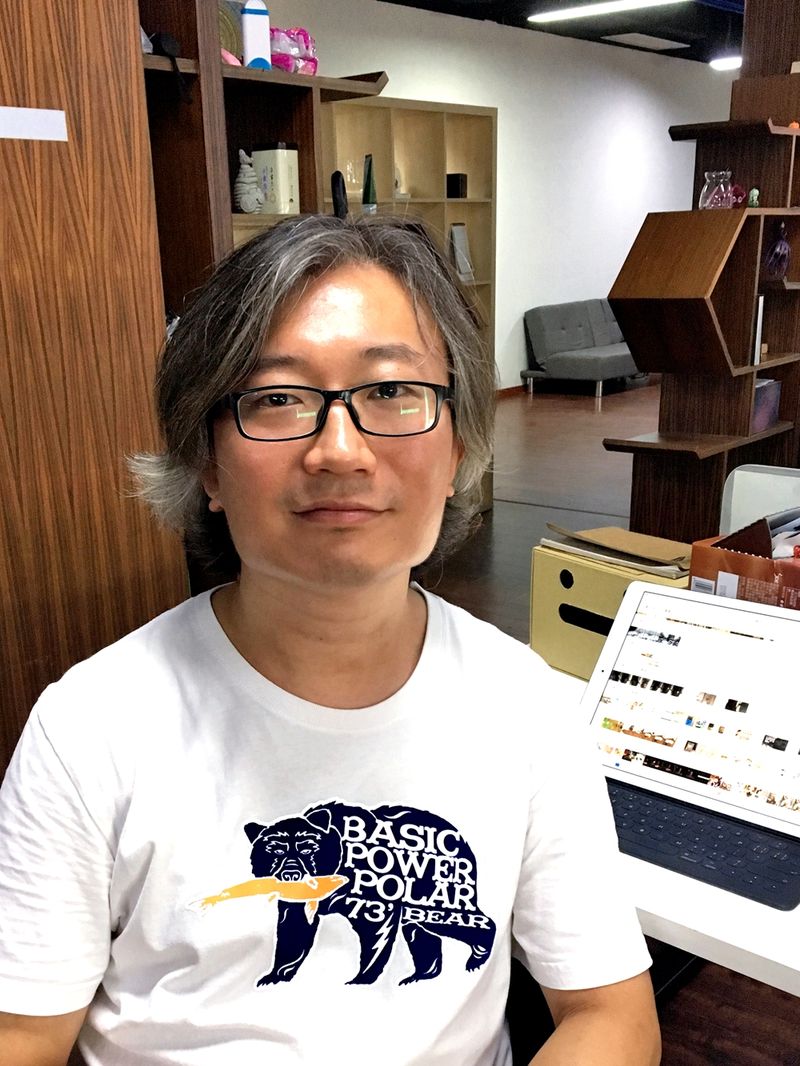
An Wei (安蔚)
An Wei trained as an engineer with a degree in automation from Tongji University, but left the profession to become a writer. Mostly focused on fantasy, sci-fi, and screenwriting, An’s best-known work is The Grey, a steampunk animation series that has gained over two million views on Bilibili, one of China’s top video-sharing sites.
Lighthouse | Fiction is a story from our issue, “The Masculinity Issue.” To read the entire issue, become a subscriber and receive the full magazine.





